You’ve been out to your pool and have heard a humming or buzzing noise coming from your pool pump. On closer inspection, you’ve found that the pump is not spinning or pumping any water.
Do you need to replace the pump or can you fix it? Why is it humming and what can you do about it?
There are several common reasons pool pumps hum and do not pump water or work. They are:
- Faulty or Bad Capacitor
- Blocked Impeller
- Seized Bearings
- Burnt Out Motor Windings
- Pump Not Primed
First, let’s do a quick overview of the step-by-step troubleshooting instructions to diagnose the problem and fix your pump.
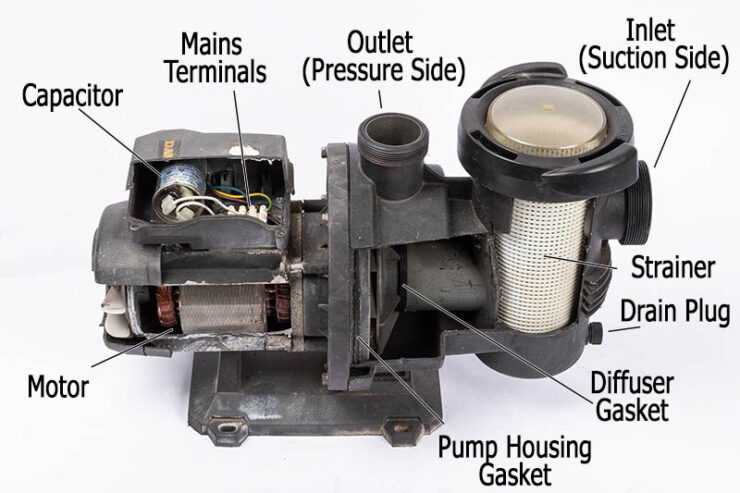
Then we’ll take a closer look into the different reasons why pool pumps hum and buzz. And we’ll look at some quick fixes.
How to Troubleshoot & Fix a Humming Pool Pump
When troubleshooting a humming or buzzing pool pump, always start with the simplest things to check. The process is the same regardless of if you own an Intex pump, Hayward, Pentair, Davey, Onga, or any other brand pool pump.
Below is a quick list of steps to take and the order to check things in. Further on in the article, I go into details for each of these steps.
1. Check the pump is primed.
The pump should be filled to the brim with water inside the pump lid.
2. Check for a Blocked Impeller
With the power off, open the lid of the pump and check for blockages.
3. Check the Shaft of the Pump Spins Freely
With the power off, use a screwdriver to check you can turn the pump’s shaft freely.
4. Check the Pool Pump Capacitor
Look for burnt or bulging capacitors.
5. Check for Loose Terminals
While you have the cover off the pump and power switched off, check the terminals connecting the power are tight.
6. Check for if the Motor is Burnt Out
This is the most complex and time-consuming task on the list. Smell the motor. If it has a burnt smell, it could be faulty. Use a multimeter to check the resistance of the windings.
Reasons Why Pool Pumps Hum
We’ll start out with some reasons why your pump is humming and not pumping water. In most of these cases, we’re assuming the pump is not turning and isn’t pumping water.
If your pump does not turn and only hums, DO NOT leave your pump on for more than a few seconds. You may burn out the motor.
Warning: Firstly, working with electricity can be deadly. Unless you’re qualified, I don’t recommend you work on electrical items.
1. Faulty or Bad Capacitor
The pool pump capacitors are by far the most common reason why a pool pump buzzes or hums and doesn’t turn or move. Some pumps have two capacitors (startup and run capacitor) and others have one (start capacitor).
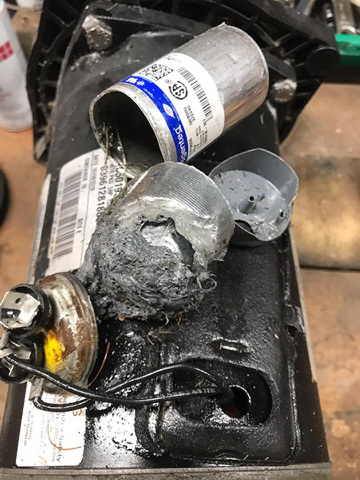
If these parts aren’t working correctly, the pump may start intermittently or often not at all. Instead, the pump will not turn and will make a humming noise. Sometimes, the circuit breaker or GFCI will trip. You may also notice that the motor is warm to the touch.
We have a full article on diagnosing and fixing pool pump capacitors here
How to Check The Capacitor and Fix It
Pool pump capacitors are usually located inside a box mounted on the pump or inside the pool pump. Remember, this can be dangerous work. Get an electrician if you’re not qualified.
- Start by switching off the power at the circuit breaker. Test it to make sure it is off. Unplug the pump too if it’s not wired in.
- Now open the case on the side of the pump or remove the pump’s back cover. Visually inspect the capacitors. In many situations, if they’re bad, the capacitors will be burnt or misshaped. If this is the case, you just need to replace them.
- Replace the capacitor(s). The capacitors need to be of the right specifications. They will have a voltage and a capacitance written on the side. They’re measured in Microfarads (µF). The text will be something like 30 µF 370VAC.
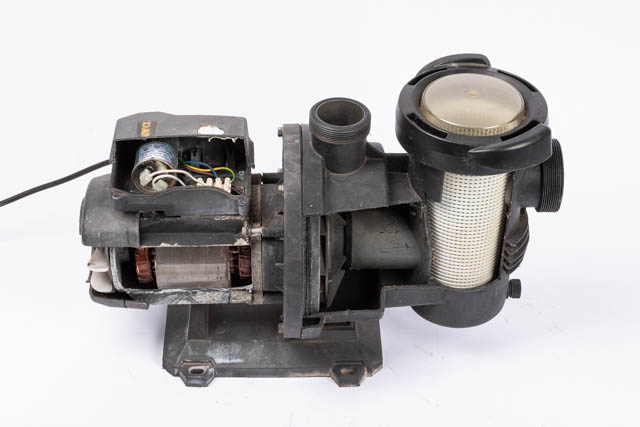
Here’s a picture showing the capacitor’s specs:
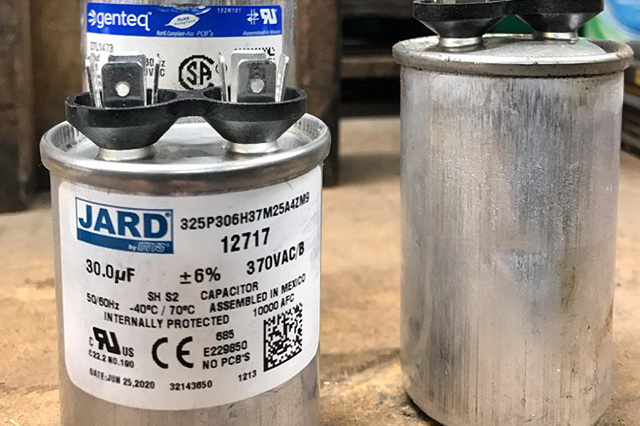
2. Blocked Impeller or Broken
Inside the pump is the impeller. The impeller spins and pulls the water through the pump. It’s a little like a propeller.
Sometimes, debris such as leaves, clothing, and many other things can get inside the pump housing where the impeller is located. Normally the pump basket stops large debris from getting inside the pump, but if the basket is cracked, debris can slip through and block the impeller.
And if debris blocks it up and prevents it from turning, then that will cause the pump to hum or buzz and not run. You could also have a damaged impeller which is preventing it from turning.
The other symptoms to look out for are that the pump motor feels warm or the circuit breaker or GFCI trips. The pump will also not move any water. These are also signs that the pump is blocked.
How to Check The Impeller for Blockages and Fix
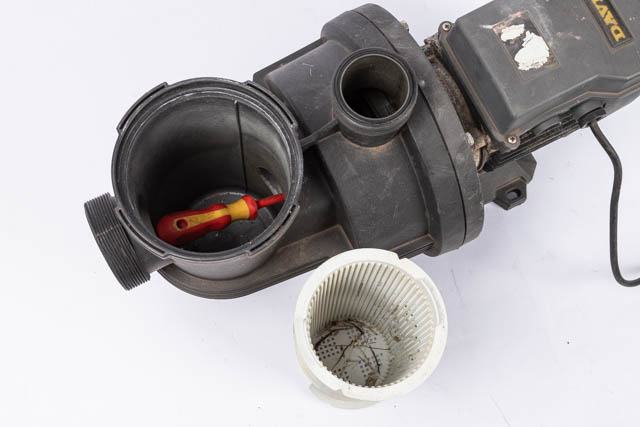
- Start by switching off the pump at the circuit breaker.
- Open the pump lid and remove the pump basket.
- Reach into the pump and feel around with your hand for debris. Try to remove it. You may need to poke a screwdriver in to loosen it.
- After clearing the impeller, put the basket back in, add some water into the pump to prime it and now put the lid back on your pump.
If you can’t clear the blockage this way, you may need to disassemble the pump and remove the impeller.
3. Seized Bearings or Pump Shaft
Pool pumps should turn freely. If they don’t, then the pump can make a buzzing or humming sound. As well as grinding and squealing noises.
If the shaft doesn’t turn, it obviously will not move any water. And additionally, the motor may get warm or hot and also trip the circuit breaker.
Pump shafts seize because:
- The bearings are gone/faulty
- Corrosion inside the pump
- Damaged shaft
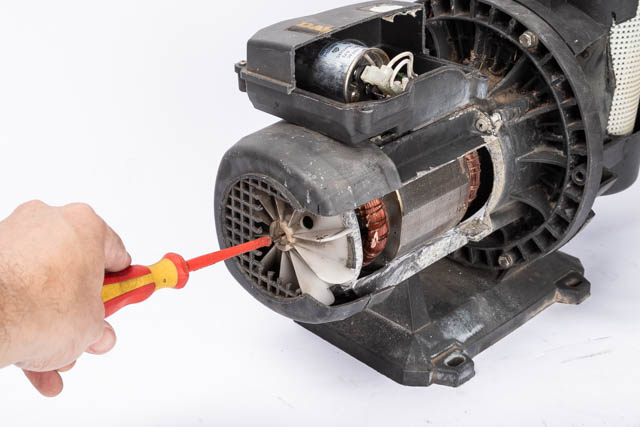
If the pump shaft is seized, it can be because the bearings are gone completely, in which case they need to be replaced.
It can also be that there is some corrosion inside the pump. This is especially common if you closed your pool for the winter and found the pump didn’t work when you opened your pool.
And finally, the pump shaft itself can bend or get misshapen, causing the pump to not operate correctly.
How to Check The Pump Shaft and Fix
This is fairly easy to diagnose. You’re going to turn the pump shaft by hand. If you can get it moving freely, then there’s a good chance you can fix the humming noise and get your pump working again.
Here’s how:
- Switch off the pump at the breaker. Test that the pump is off.
- At the back of the pump, there is usually a hole (on the motor end of the pump). This hole allows you to turn the shaft with a screwdriver. If you can’t see it, there may be a plug/cover that you need to remove first, or you may need to take the back cover of the pump off.
- Once you’ve located the hole, insert a flat-blade screwdriver into the hole and try to turn the pump shaft.
If the shaft is just a little stuck and with a bit of effort you can get it turning again, test the pump with the power switched on again. This may be all that’s required to unstick it.
On the other hand, if you’re unable to turn the shaft, or it does not spin freely, and you’ve also checked the impeller for clogs, then it’s likely the bearings are gone, or the shaft is damaged.
Bearings are replaceable, but the pump shaft may not be. It also may not be worth the cost to do these repairs. In which case, a new pump is in needed.
4. Loose Wire Terminals
Loose wire terminals could cause a pool pump to intermittently work or to make a buzzing or crackling sound. The terminals are located on the pump, where the power cable goes into the pump. They will be inside the back cover of the pump or inside a small box on the side of the pump.
For pumps or any electrical item to work properly, the wires supplying the power need to make good contact with the terminals on the item. If the terminals are loose, the wires could arc, which is like sparking. This often sounds like buzzing or crackling.
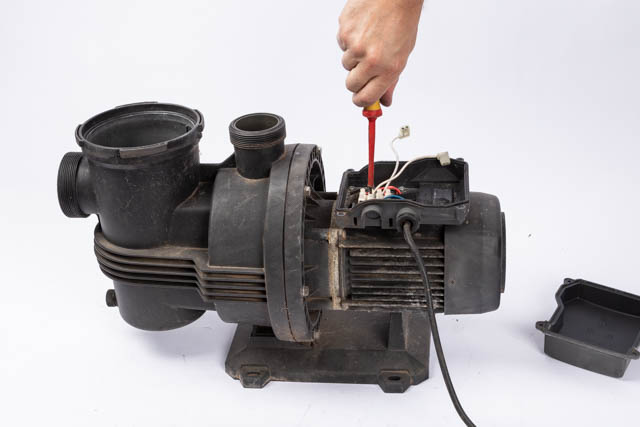
When this is the case, the pump will either not start or turn at all, or it may work intermittently.
How to Check For Loose Terminals and Fix
If you’re not qualified to work with electricity, get a professional.
- Start by switching off the power at the breaker.
- Follow the wires to the pool pump. You’ll now need to access where the wires go. This will usually involve taking a cover off.
- Inside, you’ll see the wires going into some metal terminals. Before you attempt to tighten these or touch anything, double-check the power is off with a volt meter. Now tighten up the terminals. If they were loose, that could be the problem.
5. Burnt Out Motor Windings
Pump motors can hum or buzz if they are burnt out. This will often be accompanied by the smell of burning. Kind of like the smell you get when switching on a new toaster or new fan for the first time. The smell can also be acrid too or even smell like ozone.
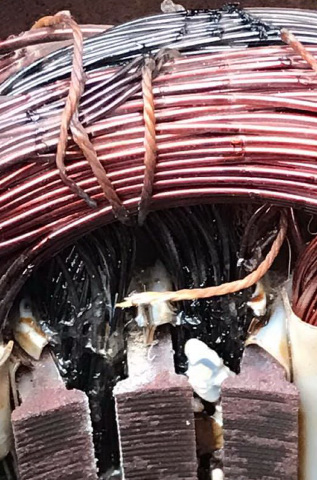
In many cases, the circuit breaker or GFCI will trip. The pump may also get warm, buzz, or hum and will not turn if the windings are burnt out.
How to Diagnose a Burnt Out Pool Pump
This problem can be tricky to diagnose. You will not be able to see the issue unless you completely dismantle the motor. Even then, it still may not be obvious.
There are two checks you can do though that don’t require you to dismantle the pump completely:
- Smell the pump motor – If it smells burnt, it could be the windings.
- Measure the Resistance of the Motor Windings – to do this, you’ll need to switch off the power at the breaker, disconnect the pump and use a multimeter set on the resistance setting. You need to measure across the pump motor windings for high resistance or open circuits.
You should also measure from the windings to the metal case of the pump. You’re looking for a short circuit here.
If the pump is faulty, you’ll need to replace it. In some cases, you can get the motor rewound with new copper windings, but these days, it’s usually just cheaper to get a new motor.
6. Pump Not Primed
Perhaps your pump seems to be turning but there is still a humming or buzzing sound. In this case, it could be that the pump has lost its prime.
Look inside the pump lid. The water should be filled to the brim. If it’s not, it could be as simple as the pump needing to be reprimed. Or you could have something a little more serious, such as a leak.
How to Prime a Pool Pump
- Switch off the pump.
- Remove the pump lid.
- Fill it with water to the brim.
- Replace the lid and restart the pump.
If this doesn’t fix the issue, we have an entire article on fixing pool pump leaks and priming problems.
How Long Do Pool Pumps Last?
On average, pool pumps can last anything from 5 years to 10 years. Cheap pumps tend to last only 2-3 years. Above-ground pumps usually last 3 to 7 years. And higher quality inground pool pumps last 5-10 years.
If you’ve followed the above steps, you should be able to fix your humming or buzzing pool pump. But if the above fails, it’s time to replace the pump or call in a pool professional.

